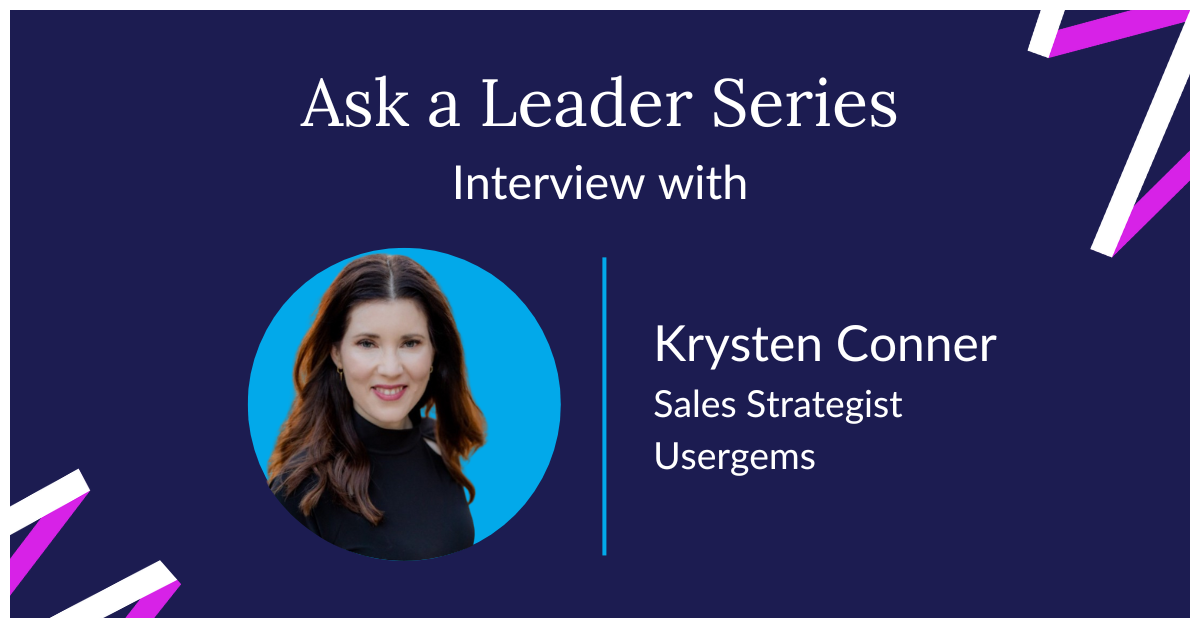In this exclusive interview with Krysten Conner, Sales Strategist at Usergems, she talks about how to sell in today's changing market, the best way to end a demo call, tips on multi-threading successfully, how to identify and develop a champion, the biggest mistake she's made in her career, plus a bonus question on what motivates her before a sales call.
1. What's your advice for selling in today's market?
The messaging is going to have to be around doing more with less, or doing more with the same, versus what sellers are more used to like ROI.
Also focusing more on retention than new logo: how do we upsell and expand into our existing customer base versus this kind of growth at all costs mentality, which we saw for the past couple of years?
And to that point, the third thing would be that how organizations are viewing things is now more in NRR, or net recurring revenue, rather than new ACB. Because the least expensive customer is the one you already have. And so just focusing on that. We sell to sales organizations, and that's what we're hearing the most focus on.
2. How do you typically end a demo call?
So I have a three-part demo framework that works very well for very short discovery calls, and it's just simply to match their urgency.
So there are three and that script kind of goes like this:
"Rita, it's been great to talk with you today, people generally join these first calls for a couple of reasons. One is just they're kind of in an education mode, they're interested in new tools that are coming out on the market, they happen to see us and they're just interested in finding out what we do. Second is they have a major revenue or churn problem that they needed to solve six months ago, and they're wondering if we can help them with that. And then the third reason is they're looking at revenue, they're looking at churn, you know, it's an issue, they want to solve it in the next 12 to 18 months, but nothing is on fire. And so I'm just curious where you would put yourself on that scale? And if it's over here, and it's just education, it's 100% fine. I'm just asking because I never want to chase anything."
And then because we've given the buyer or the prospect a range and we're not asking them to write us an essay, right, it's multiple choice, they can pick where they are. And they're also free to tell us, you know, "I was just looking" and that's valuable for us and for them, because now they're not going to have to deal with a salesperson trying to follow up 20 times. They can say, "Yeah, shoot me an email every once in a while, but I just wanted to know what you do."
3. Top tips on multi-threading successfully?
What we've found is that multi-threading by just asking for introductions rarely works. So something else to consider before that first meeting is what I call the three-by-three-by-three method. And that means three buying personas, three-step sequence, three-part follow-up.
So first of all, the three buying personas before that first call. You want to find three people with VP titles, from departments that are typically involved in buying what you sell. And then you want to put all three of those into a three-step sequence that starts four to seven days before that first call.
The first touch is you're just going to leave a thoughtful comment on something that they post on LinkedIn. The second touch is you're going to give them a LinkedIn connection request, and you're gonna mention the post that you saw. And then the third touch would be either an email or a LinkedIn message about the meeting that you have coming up with someone else from their company that says, you know, "Hey, Rita, your colleague scheduled a meeting with me. I thought you might be interested. The topic is tracking your past buyers' job changes and also lowering churn risk. Also, automatic multi-threading. Executives in your department aren't always involved, but sometimes they have specific OKRs that are relevant. Should I forward an invite? If not, that's fine, happy to keep you posted."
And then the three-part follow-up is, on the day that you have the meeting with their colleague, you're going to send them a very short three-bullet recap of that meeting. Also, on the day of the meeting, you're going to put them into a nurture sequence. It's usually something to do with thought leadership. Or if there are additional meetings on the calendar, reminding you to follow up with them and give them that recap.
And then a week later, you're gonna ghostwrite an email for your executives to send to the executive that you met with or the ones you've been contacting, because you want executives to start their own private channel of communication about your product.
4. What's the best way to develop a champion?
I like to think about it as testing to see if they are a champion. And then once we've determined that they are, kind of developing them. I like to think about it as testing to try to determine if they are a champion in three ways–by asking them for three different things.
The first is by asking them for introductions to other people in their organization who are interested or have a stake in what you're selling. Not necessarily executives, but just an introduction to someone else on their team or in their org.
Second, I like to ask them for specific metrics. "You said your team wants to grow your pipeline?" Probably every sales team in the world would say that. "What kind of metrics are we talking about here? Are we talking about 8% growth? Do we need 18% growth? What are we talking about?"
And then the third is I like to ask them for what I call inside information. And what I mean by that is things like, "Who on the buying committee has the most influence? What are this person's goals? Who do you think is a blocker for this type of thing?"
So in those three things– asking for introductions, metrics, inside information–we're just asking them if they're going to put a little skin in the game and stick their neck out a little bit for us. And then developing them, I like to talk them up to their peers and to leadership, either whenever we're on a call, or when I'm recapping a call. I talk about what a great job they did and point something specific out.
The second thing I like to do is help them expand their network. Leaders are always looking to network with other leaders, sometimes inside their own company, and sometimes within their industry. Ambitious leaders are wondering where they're going to move next or who is my peer that I would really like to collaborate with. So those introductions are valuable. And then to help them by increasing their visibility, like having them on a webinar or asking them to do a podcast with us, asking them to be a panelist on our customer panel, all of that increases their own visibility. They can post that on social–it's important to them, and it's going to help them out.
And then the last thing is equipping them with resources. So either things like thought leadership that helps them with a current problem they have or to aid their decision. But the bottom line on developing them is we want to make them look good. And we also want to feed their motivation to continue to work with us.
5. What's the biggest mistake you've made in your career?
The biggest mistake I ever made was ignoring clear red flags during an interview process and when reading about a company. And then choosing to work there anyway because it was a big-name company and one I had wanted to work with.
And I want to point out that sometimes you can see those red flags and know what you're in for. And you can just decide that it's worth it to you to have that experience or to have that name on your resume. I think for me, there would have been other ways to get where I was going that would have been a lot less painful. ]
Bonus - A song that motivates you?
I mean, that has to be Formation by Beyoncé. Is there another answer to that question?





